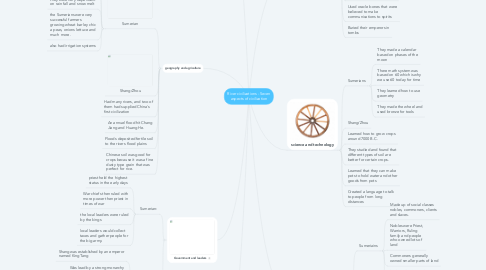
1. economy and trade
1.1. Sumerians
1.1.1. there natural location lacked many natural elements
1.1.2. exchanged woven textiles for metal, timber and other things they lacked
1.1.3. there land was placed along trade routes
1.1.4. they made the majority of there money by controlling trade routes
1.2. Shang/Zhou
1.3. originally a tribe but over the years it grew to a great size
1.4. first civilization established by King Jang
1.5. Overthrew tyrannical rule of Jie
1.6. Shang civilization lasted over 600 years and was lead by over 30 different emperors
2. geography and agriculture
2.1. Sumerian
2.1.1. there environment was very well suited for farming
2.1.2. the land in the early years was very flat and swampy
2.1.3. they were very dependent on rain fall and snow melt
2.1.4. the Sumerians were very successful farmers growing wheat barley chic a peas, onions lettuce and much more.
2.1.5. also had irrigation systems
2.2. Shang/Zhou
2.3. Had many rivers, and two of them had supplied China's first civilization
2.4. An annuel flood hit Chang Jiang and Huang He.
2.5. Floods deposited fertile soil to the rivers flood plains
2.6. Chinese soil was good for crops because it was a fine dusty type grain that was perfect for rice.
3. Government and leaders
3.1. Sumerian:
3.1.1. priest held the highest status in the early days
3.1.2. War chiefs then ruled with more power then priest in times of war
3.1.3. the local leaders were ruled by the kings
3.1.4. local leaders would collect taxes and gather people for the big army.
3.2. Shang/Zhou
3.2.1. Shang was established by an emperor named King Tang
3.2.2. Was lead by a strong monarchy
3.2.3. Shang was the oldest known civilization
3.2.4. Zhou leader thought of man dating to get accepted by the Chinese
4. arts and education
4.1. Sumerian
4.1.1. they constructed arches, ramps and coulombs
4.1.2. the statues they made were very large and had wide eyes
4.1.3. the small objects were carved out of ivory
4.1.4. cuneiform is sumerian writing made of tablets that symbols were carved into
4.2. Shang/Zhou
4.3. Learned to use iron that became the backbone of their economy
4.4. Learned how to make weapons out of steel which Zhou army
4.5. Farmers learned new strategies that improved their harvest
4.6. Learned how to build rivers, canals and roads
5. Religion
5.1. Sumerians
5.1.1. practiced polytheism which is the worship of many gods
5.1.2. they believed god controlled all natural forces.
5.1.3. believed that gods were like humans. Loved, Married, Fought and Ate
5.1.4. they made temples, made sacrifices and worshipped the gods
5.2. Shang/Zhou
5.3. Prepared meals for their ancestors and the steam was believed to nourish the spirits
5.4. Had strong belief in afterlife
5.5. Used oracle bones that were believed to make communications to spirits
5.6. Buried their emperors in tombs
6. science and technology
6.1. Sumerians
6.1.1. They made a calendar based on phases of the moon
6.1.2. There math system was based on 60 which is why we use 60 today for time
6.1.3. They learned how to use geometry
6.1.4. They made the wheel and used bronze for tools
6.2. Shang/Zhou
6.3. Learned how to grow crops around 7000 B.C.
6.4. They studied and found that different types of soil are better for certain crops.
6.5. Learned that they can make pots to hold water and other goods from pots
6.6. Created a language to talk to people from long distances
7. social structure and famiy
7.1. Sumeriains
7.1.1. Made up of social classes nobles, commoners, clients and slaves.
7.1.2. Nobles were Priest, Warriors, Ruling family and people who owned lots of land
7.1.3. Commoners generally owned smaller parts of land
7.1.4. husband had complete control over household and could even sell wife and children into slavery
